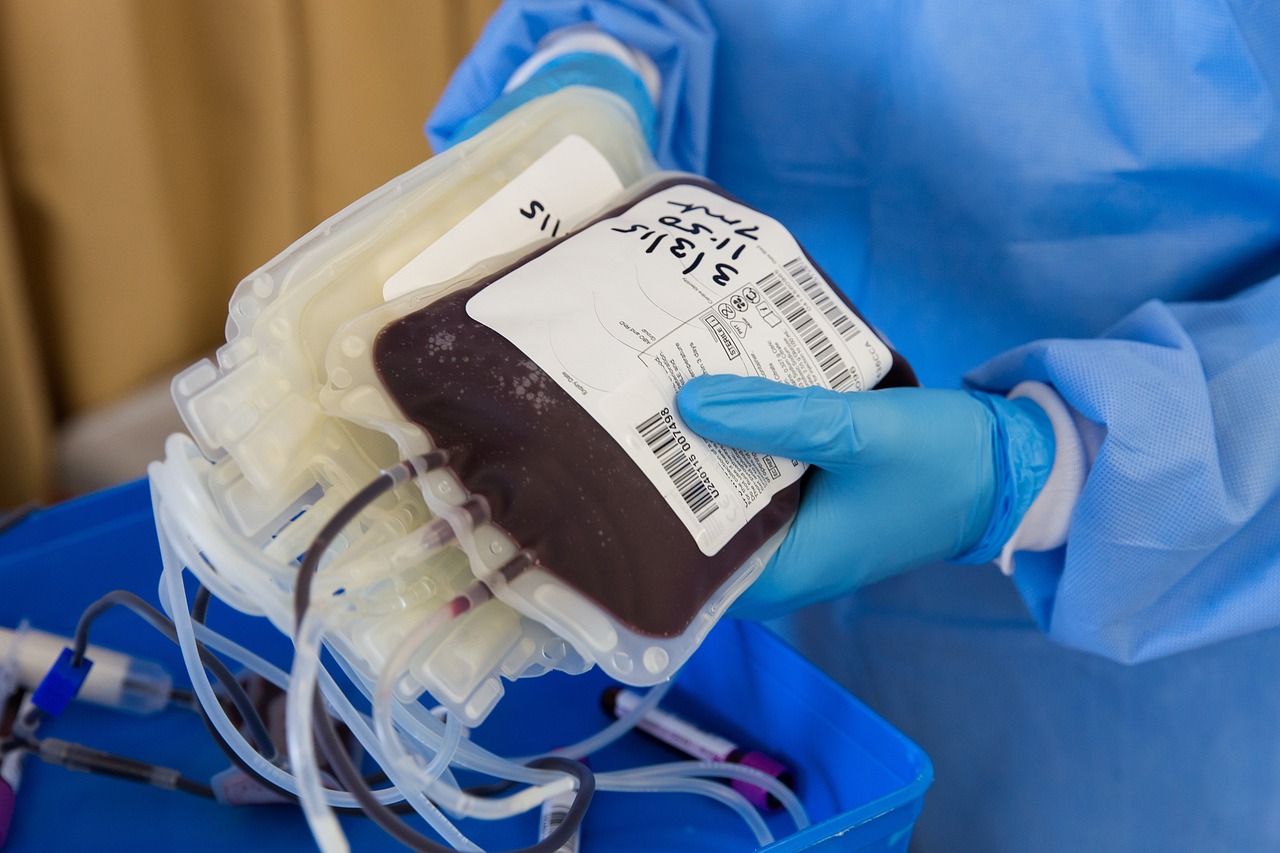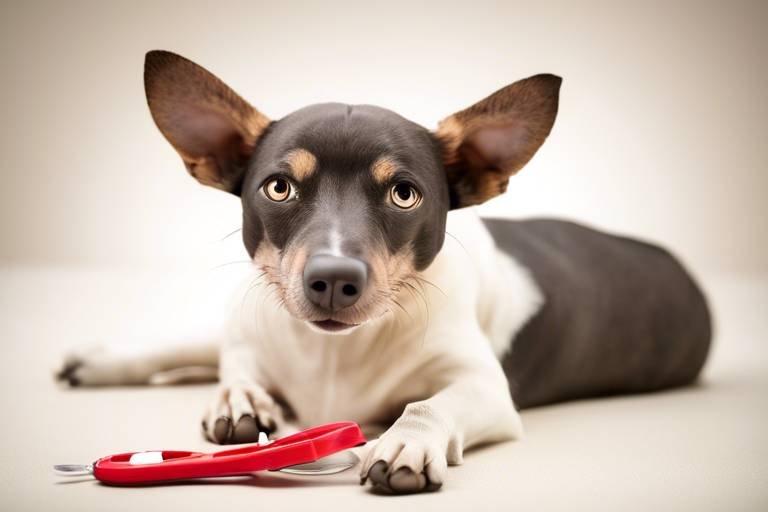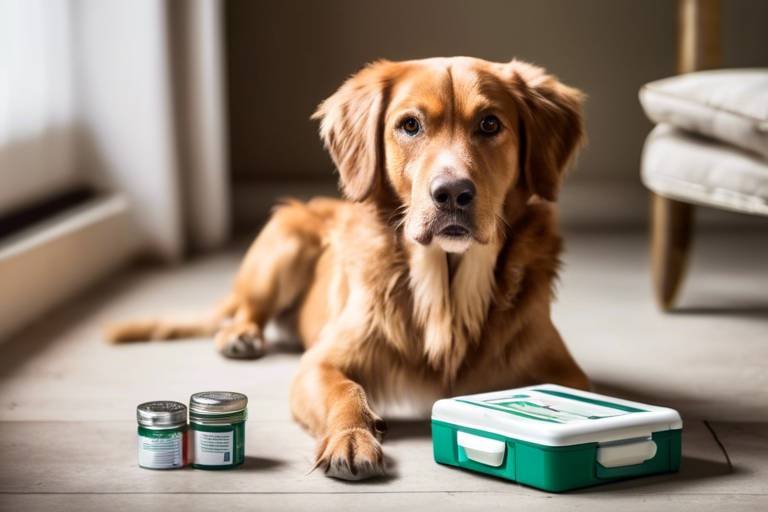First Aid for Common Gastrointestinal Issues in Pets
As pet owners, we all want our furry companions to be healthy and happy. However, gastrointestinal issues can arise unexpectedly, leaving us worried and unsure of how to help. Understanding the first aid techniques for common gastrointestinal problems in pets is crucial for providing immediate care and comfort. Whether your pet is a playful puppy or a wise old cat, knowing how to address these issues can make a significant difference in their well-being.
Gastrointestinal problems can be a real rollercoaster ride for both pets and their owners. Picture this: your dog, who usually devours his food in seconds, suddenly turns his nose up at dinner. Or your cat, who loves to chase after her toys, is now lethargic and hiding in her favorite spot. These changes can be alarming, but with the right knowledge, you can navigate these challenges with confidence. In this article, we'll explore essential first aid techniques, common symptoms to watch for, and when it’s time to call in the professionals.
Gastrointestinal issues in pets can manifest in various forms, and recognizing the symptoms early can help in providing timely first aid and ensuring your pet's health and comfort. The gastrointestinal tract is responsible for digesting food, absorbing nutrients, and eliminating waste, so when something goes awry, it can lead to discomfort or serious health concerns. Common issues include vomiting, diarrhea, and constipation, all of which can be distressing for both pets and their owners.
Identifying symptoms like vomiting, diarrhea, or lack of appetite is crucial. These signs can indicate underlying health problems that may require immediate attention. Keep an eye out for:
- Vomiting: This can range from occasional regurgitation to severe, persistent vomiting.
- Diarrhea: Loose or watery stools can lead to dehydration if not addressed promptly.
- Lack of Appetite: If your pet suddenly refuses food, it could signal a gastrointestinal issue.
- Abdominal Pain: Signs of discomfort, such as whining or excessive grooming, can indicate trouble.
Understanding these symptoms can empower you to take action quickly, ensuring your pet receives the care they need.
Vomiting can be caused by numerous factors, including dietary indiscretion, infections, or even stress. It’s essential to assess your pet’s overall condition to determine the best course of action. If your pet vomits occasionally but seems otherwise healthy, it may not be a cause for concern. However, persistent vomiting or the presence of blood in the vomit is a red flag. In such cases, managing it effectively at home before seeking professional help can involve:
- Withholding food for 12-24 hours to allow the stomach to settle.
- Introducing bland foods, such as boiled chicken and rice, gradually.
- Ensuring your pet stays hydrated with fresh water.
Not all vomiting episodes are serious, but certain signs should prompt immediate veterinary attention. Watch for:
- Repeated vomiting over several hours.
- Vomiting accompanied by lethargy or weakness.
- Presence of blood in vomit.
- Signs of pain or discomfort, such as whining or a tense abdomen.
Mild vomiting cases can often be treated at home. Here are some safe home remedies to ease your pet's discomfort and promote recovery:
- Ginger: A small amount of ginger can help soothe the stomach.
- Probiotics: These can aid in restoring gut health.
- Hydration: Offer electrolytes specifically designed for pets.
Diarrhea is another common gastrointestinal symptom that can lead to dehydration if not addressed promptly. It can be caused by dietary changes, infections, or parasites. If your pet experiences diarrhea, it's important to monitor their condition closely. First aid measures include withholding food for a short period, ensuring they drink plenty of water, and gradually reintroducing a bland diet. If diarrhea persists for more than 24 hours or if you notice blood, it’s time to consult your veterinarian.
Preventing gastrointestinal issues is key to your pet's overall health. A few simple steps can make a world of difference in keeping your pet's digestive system functioning properly. Regular vet check-ups, a balanced diet, and a stable environment can help reduce the risk of gastrointestinal problems.
A balanced diet is vital for gastrointestinal health. Ensure your pet's food includes high-quality proteins, fiber, and essential nutrients while avoiding harmful ingredients like artificial additives. It's also important to introduce new foods gradually to prevent digestive upset.
Routine veterinary visits can catch potential issues early. Regular check-ups are essential in preventing severe gastrointestinal problems in pets. Your vet can provide tailored advice on diet, lifestyle, and preventive care that suits your pet's specific needs.
Q: What should I do if my pet is vomiting?
A: Withhold food for 12-24 hours, ensure hydration, and monitor for other symptoms. If vomiting persists, contact your vet.
Q: How can I prevent diarrhea in my pet?
A: Maintain a consistent diet, avoid sudden changes, and ensure your pet is up-to-date on vaccinations and deworming.
Q: When should I take my pet to the vet for gastrointestinal issues?
A: If symptoms persist for more than 24 hours, if you notice blood, or if your pet shows signs of severe discomfort, seek veterinary care immediately.

Understanding Gastrointestinal Issues
Gastrointestinal issues in pets can be as perplexing as trying to solve a puzzle with missing pieces. These problems can arise due to a variety of reasons, ranging from dietary indiscretions to underlying health conditions. Understanding the gastrointestinal tract of your furry friend is crucial for identifying and addressing these issues promptly. The gastrointestinal system includes the stomach, intestines, and other organs that play a vital role in digestion and nutrient absorption. When this system is disrupted, it can lead to discomfort and distress for your pet.
Common gastrointestinal issues can manifest in several ways, often presenting with symptoms that might seem benign at first but can escalate quickly. For instance, a simple case of upset stomach can lead to more serious conditions if not addressed in a timely manner. It's essential to be vigilant and observant of your pet's behavior and habits. Factors such as stress, sudden changes in diet, or even infections can trigger gastrointestinal problems.
Moreover, understanding the signs and symptoms that accompany these issues is key to providing effective first aid. A pet that is experiencing gastrointestinal distress may exhibit a range of behaviors, including:
- Vomiting: This can occur due to various factors, including dietary indiscretion or infections.
- Diarrhea: Loose or watery stools can indicate a problem in the digestive tract.
- Lack of Appetite: A sudden disinterest in food can be a red flag for underlying issues.
- Abdominal Pain: Pets may show signs of discomfort, such as whining or reluctance to be touched.
Recognizing these symptoms early can make a significant difference in your pet's health and comfort. It's like catching a small leak in a roof before it turns into a waterfall! The sooner you can identify gastrointestinal problems, the better the chances are of managing them effectively at home or with veterinary assistance.
In summary, being aware of the gastrointestinal health of your pet is not just about recognizing symptoms; it’s about understanding the underlying causes and being prepared to act quickly. Whether it’s a minor upset or a more serious condition, your attentiveness can lead to better outcomes for your beloved companion.

Common Symptoms to Watch For
When it comes to our beloved pets, being vigilant about their health is essential. Gastrointestinal issues can sneak up on you, often manifesting in subtle ways before they escalate into something more serious. Identifying symptoms early is crucial for providing timely first aid and ensuring your pet's comfort. Some of the most common symptoms that pet owners should be on the lookout for include vomiting, diarrhea, and a lack of appetite. Each of these signs can indicate different underlying issues, so let’s break them down a bit further.
First up, vomiting. It’s one of the most noticeable signs that something might be off with your furry friend. While an occasional vomit may not be a cause for concern, frequent vomiting can lead to dehydration and other serious health issues. If your pet is vomiting, try to observe what they’ve eaten or if they’ve been exposed to any toxins. You might also want to keep track of how often it happens and the appearance of the vomit—these details can be invaluable to your vet.
Next, let’s talk about diarrhea. This can range from mild to severe and can be caused by a variety of factors, including dietary indiscretion or infections. If your pet has diarrhea, it’s not just uncomfortable for them; it can also lead to dehydration. Keep an eye on their stool consistency, and if it persists for more than a day or two, it’s time to consult a veterinarian. In some cases, diarrhea can be accompanied by other symptoms like vomiting or lethargy, which can indicate a more serious condition.
A lack of appetite is another significant symptom that should never be overlooked. If your pet suddenly refuses to eat or shows a marked decrease in their food intake, it could be a sign of gastrointestinal distress or other health issues. Just like humans, pets can have off days, but a prolonged lack of appetite is a red flag. Pay attention to any other accompanying symptoms like vomiting or lethargy, as they can provide more clues to what’s going on.
In summary, being aware of these common symptoms—vomiting, diarrhea, and lack of appetite—can help you take action before a minor issue turns into a major health problem. If you notice any of these signs, it’s always wise to consult with your veterinarian for a proper diagnosis and treatment plan. Remember, your pet relies on you to be their voice when they can’t express what’s wrong!
- What should I do if my pet is vomiting? Monitor their vomiting frequency and appearance, and consult your vet if it continues or is accompanied by other symptoms.
- How can I tell if my pet is dehydrated? Check for dry gums, lethargy, and skin elasticity. If you suspect dehydration, contact your veterinarian immediately.
- Is diarrhea in pets always serious? Not always, but if it persists for more than a day or is accompanied by vomiting or lethargy, it’s best to consult your vet.
- What dietary changes can help prevent gastrointestinal issues? A balanced diet tailored to your pet's needs, avoiding sudden changes, and limiting table scraps can help maintain their digestive health.
Vomiting in Pets
Vomiting in pets can be a distressing sight for any pet owner. It's like watching your furry friend hit a speed bump in their health journey, and it can leave you feeling helpless and anxious. Understanding the underlying causes of vomiting is crucial, as it can stem from a variety of issues ranging from minor irritations to serious health concerns. Some common reasons pets might vomit include:
- Dietary indiscretion: Pets love to explore, and sometimes that means eating things they shouldn't, such as spoiled food or foreign objects.
- Infections: Viral or bacterial infections can upset your pet's stomach, leading to vomiting.
- Parasites: Intestinal worms and other parasites can wreak havoc on your pet's digestive system.
- Chronic conditions: Issues like kidney disease, liver problems, or pancreatitis can also manifest as vomiting.
When your pet vomits, it's essential to assess the situation calmly. First, observe the frequency and appearance of the vomit. Is it just a small amount of bile, or is it more substantial? Is there any blood or unusual color? These details can be vital for your veterinarian. If your pet vomits once or twice but seems otherwise healthy, it might not be a cause for alarm. However, if the vomiting persists or is accompanied by other symptoms such as lethargy, diarrhea, or a lack of appetite, it's time to take action.
Managing vomiting at home can often be effective, especially in mild cases. Start by withholding food for 12-24 hours to give their stomach a chance to settle. After this period, gradually reintroduce a bland diet, such as boiled chicken and rice, in small amounts. This gentle approach can help your pet's digestive system recover without overwhelming it. Always ensure your pet has access to fresh water to prevent dehydration, which can be a significant risk with vomiting.
While occasional vomiting may not be serious, there are red flags that indicate a more severe condition. If you notice any of the following, it's crucial to seek veterinary attention:
- Vomiting persists for more than 24 hours.
- There is blood in the vomit.
- Your pet appears lethargic or unresponsive.
- Vomiting is accompanied by diarrhea, especially if it is severe.
- Your pet is unable to keep water down.
Being vigilant and proactive can make all the difference in your pet's health. Remember, your furry friend relies on you to recognize when something is off. If you're ever in doubt, it's always better to err on the side of caution and consult your veterinarian.
For those instances when your pet experiences mild vomiting, there are several home remedies you can try to ease their discomfort:
- Ginger: Known for its anti-nausea properties, ginger can be beneficial. You can offer a small amount of ginger tea or ginger snaps designed for pets.
- Pumpkin: Canned pumpkin (not the spiced pie filling) can help soothe the stomach and firm up stools.
- Probiotics: These can help restore the natural balance of bacteria in your pet’s gut, aiding digestion.
While these remedies can be helpful, always consult with your veterinarian before trying anything new, especially if your pet has underlying health issues or is on medication.
When to Worry About Vomiting
Vomiting in pets can sometimes feel like a rollercoaster ride—one moment they're fine, and the next, they're heaving up their last meal. While occasional vomiting is often not a cause for alarm, there are certain situations that should raise a red flag. Understanding when to be concerned can be the difference between a minor issue and a serious health crisis.
First off, if your furry friend is vomiting repeatedly or if the vomiting is accompanied by other symptoms, it's time to pay close attention. For instance, if your pet is also experiencing diarrhea, lethargy, or loss of appetite, these could be signs of a more significant problem. Additionally, if you notice blood in the vomit or if the vomit has a strange color or consistency, such as a coffee ground appearance, these are serious indicators that require immediate veterinary attention.
Another crucial point to consider is the duration of the vomiting. If your pet has been vomiting for more than 24 hours, it’s essential to consult your veterinarian. Prolonged vomiting can lead to dehydration, which can be particularly dangerous for pets. Especially in smaller animals, the risk of dehydration escalates quickly, potentially leading to severe health complications.
Here’s a quick checklist to help you determine when to seek veterinary care:
- Frequency: Vomiting more than once or twice in a short period.
- Accompanying Symptoms: Presence of diarrhea, lethargy, or loss of appetite.
- Blood: Any blood in the vomit or unusual color/consistency.
- Duration: Vomiting persists for over 24 hours.
- Age and Health Status: Young, elderly, or pets with pre-existing conditions should be monitored closely.
Finally, if your pet has ingested something toxic or potentially harmful, such as certain plants or human foods, don’t wait. Contact your veterinarian or an emergency animal clinic immediately. The quicker you act, the better the chances of a positive outcome.
In conclusion, while vomiting can be a common occurrence in pets, it’s essential to be vigilant. By keeping an eye on your pet’s overall behavior and health, you can catch potential issues early and ensure your furry companion stays happy and healthy. Remember, when in doubt, it’s always best to err on the side of caution and consult a professional.
Home Remedies for Mild Cases
When your furry friend experiences mild vomiting, it can be quite distressing for both of you. However, before you panic and rush to the vet, there are several home remedies you can try to help soothe your pet's stomach. Think of these remedies as a gentle hug for their digestive system, providing comfort and relief. First and foremost, ensure your pet has access to fresh water to prevent dehydration. If your pet is reluctant to drink, try offering ice cubes or ice chips, which can be more appealing.
One of the most effective home remedies is to withhold food for 12 to 24 hours. This fasting period allows your pet's stomach to settle and recover from whatever upset it. After the fasting period, you can gradually reintroduce food by offering a bland diet. This can include boiled chicken (without skin or bones) mixed with plain white rice. The simplicity of this meal helps ease their digestive system back into action.
In addition to bland diets, you might consider adding pumpkin puree to their meals. Pumpkin is rich in fiber, which can help regulate digestion and firm up loose stools. Just make sure to use plain canned pumpkin, not the spiced pie filling, as the added sugars and spices can worsen their condition.
Another helpful remedy is to give your pet small amounts of plain, unsweetened yogurt. Yogurt contains probiotics that can help restore the natural balance of bacteria in their gut. However, be cautious if your pet is lactose intolerant; if you notice any signs of discomfort after giving yogurt, it’s best to discontinue use.
Lastly, keep a close eye on your pet's behavior. If they seem lethargic, have a fever, or continue to vomit after trying these remedies, it’s crucial to seek veterinary care. Remember, these home remedies are for mild cases only; when in doubt, always consult your veterinarian.
- What should I do if my pet continues to vomit after trying home remedies? If your pet continues to vomit after 24 hours of home care, it's important to consult your veterinarian for a thorough examination.
- Can I use over-the-counter medications for my pet's vomiting? It's best to avoid giving any medications without consulting your vet, as some human medications can be harmful to pets.
- How can I tell if my pet is dehydrated? Signs of dehydration include dry gums, lethargy, and skin that doesn't return to its normal position when gently pinched.
Diarrhea in Pets
Diarrhea in pets is more than just an inconvenience; it can be a sign of underlying health issues that require immediate attention. When your furry friend experiences diarrhea, it can be alarming, especially when you consider how quickly dehydration can set in. So, what causes this troublesome symptom? Well, there are numerous potential culprits, ranging from dietary indiscretion—like that time your dog snuck a whole pizza slice—to infections, parasites, or even stress. Each of these factors can disrupt the normal functioning of your pet's gastrointestinal system, leading to loose stools.
It's essential to monitor your pet's condition closely. If the diarrhea is mild and your pet is still active, drinking water, and eating normally, you might be able to manage the situation at home. However, if the diarrhea persists for more than 24 hours, or if your pet shows additional symptoms such as vomiting, lethargy, or blood in the stool, it's crucial to seek veterinary care immediately. Remember, your pet relies on you to recognize when something is off.
To help you better understand the potential causes of diarrhea, here’s a table summarizing some common triggers:
| Cause | Description |
|---|---|
| Dietary Indiscretion | Eating something they shouldn't, like spoiled food or human snacks. |
| Infections | Bacterial, viral, or parasitic infections can disrupt gut health. |
| Stress | Changes in environment or routine can lead to gastrointestinal upset. |
| Medications | Certain medications can cause diarrhea as a side effect. |
While it can be tempting to try and treat your pet's diarrhea with home remedies, it's essential to proceed with caution. Some pets may benefit from a brief period of fasting followed by a bland diet, such as boiled chicken and rice. This can help settle their stomachs and allow their digestive systems to recover. However, always consult your veterinarian before starting any treatment, as what works for one pet may not be suitable for another.
In conclusion, diarrhea can be a serious issue for pets, but with proper attention and care, you can help your furry friend get back to their happy, tail-wagging self. Always keep a close eye on their condition and don’t hesitate to reach out to your vet for guidance. After all, when it comes to your pet's health, it's better to be safe than sorry!
- What should I do if my pet has diarrhea? Monitor their condition closely, ensure they stay hydrated, and consult your veterinarian if it persists.
- Can I give my pet over-the-counter medications for diarrhea? It's best to consult your vet before administering any medications.
- How can I prevent diarrhea in my pet? Maintain a consistent diet, avoid giving table scraps, and ensure regular vet check-ups.

Preventative Measures for Gastrointestinal Health
When it comes to ensuring your pet's gastrointestinal health, prevention is always better than cure. Just like we humans take care of our digestive systems by being mindful of what we eat, our furry friends deserve the same level of attention. A proactive approach can save you from numerous stressful situations down the line. So, what can you do to keep your pet's tummy happy? Let's dive into some essential preventative measures!
First and foremost, dietary considerations play a significant role in maintaining gastrointestinal health. Providing your pet with a balanced diet is akin to fueling a high-performance car with the right type of gasoline. You wouldn’t want to compromise on quality, would you? Look for pet foods that are rich in nutrients, and always check the ingredients list. Avoid foods that contain artificial preservatives, excessive fillers, and low-quality meat sources. Instead, opt for high-quality proteins and digestible carbohydrates. Additionally, consider incorporating fiber-rich foods into their diet, as fiber aids in digestion and can help prevent constipation.
Next up, regular vet check-ups are crucial. Just like we visit the doctor for routine health screenings, your pets need the same care. Scheduling regular veterinary visits can help catch potential gastrointestinal issues before they escalate into something serious. During these check-ups, your vet can provide valuable insights into your pet’s dietary needs and general health, ensuring that any underlying issues are addressed promptly. Remember, a stitch in time saves nine!
Another important aspect is to keep your pet's environment clean and safe. Pets are naturally curious and often explore the world around them with their mouths. This behavior can lead them to ingest harmful substances or spoiled food, which can wreak havoc on their digestive system. Always ensure that your home is free from hazardous items, and be mindful of what they can access outdoors. Keeping a close eye on their eating habits can also help; if they suddenly start scavenging or eating things they shouldn't, it might be time for a vet visit.
Additionally, consider implementing a consistent feeding schedule. Just like humans thrive on routine, pets also benefit from regular meal times. This not only helps in managing their hunger but also supports a healthy digestive rhythm. Aim to feed your pet at the same times each day, and avoid giving them table scraps or sudden diet changes, as these can upset their stomachs.
Lastly, hydration is key! Make sure your pet has access to fresh, clean water at all times. Dehydration can lead to a host of gastrointestinal problems, including constipation and more serious conditions. Keeping your pet hydrated is like keeping the oil in your car topped up; it ensures everything runs smoothly.
By following these preventative measures, you can help ensure your furry companion stays healthy and happy. Remember, a little attention to your pet’s diet and lifestyle can go a long way in preventing gastrointestinal issues. So, the next time you’re at the pet store or planning your pet’s meals, keep these tips in mind!
- What are the signs of gastrointestinal distress in pets? Look for symptoms like vomiting, diarrhea, lack of appetite, and lethargy.
- How often should I take my pet to the vet? Regular check-ups are recommended at least once a year, but more frequent visits may be necessary for older pets or those with health issues.
- Can I give my pet human food? Some human foods are safe for pets, but always consult your vet before introducing new foods to avoid gastrointestinal upset.
- What should I do if my pet is vomiting or has diarrhea? Monitor their symptoms and consult your vet if they persist or worsen.
Dietary Considerations
When it comes to keeping our furry friends happy and healthy, diet plays a pivotal role. Just like humans, pets require a balanced diet to maintain optimal gastrointestinal health. It's essential to think of your pet's digestive system as a finely tuned engine; if you feed it the right fuel, it will run smoothly. But what does this 'fuel' look like? Well, it includes high-quality proteins, healthy fats, and a variety of carbohydrates, all tailored to your pet's specific needs.
One of the first things to consider is the type of food you choose for your pet. Look for premium pet foods that list real meat as the first ingredient. This ensures that your pet is getting the necessary proteins for energy and muscle maintenance. Additionally, avoid foods with fillers like corn and soy, which can lead to digestive issues. Instead, opt for whole grains like brown rice or oats, which provide fiber and can help regulate your pet's digestive system.
Not only should you pay attention to the ingredients, but also the portion sizes. Overfeeding can lead to obesity, which is a significant risk factor for various gastrointestinal problems. Remember, a healthy pet is a happy pet! You can consult your veterinarian for specific recommendations based on your pet’s age, weight, and activity level. As a general rule of thumb, you might consider the following:
| Pet Type | Recommended Daily Amount |
|---|---|
| Small Dogs (up to 20 lbs) | 1/2 to 1 cup |
| Medium Dogs (20-50 lbs) | 1 to 2 cups |
| Large Dogs (50 lbs and above) | 2 to 4 cups |
| Cats | 1/2 to 1 cup |
Moreover, don't overlook the importance of hydration. Fresh water should always be available, as dehydration can exacerbate gastrointestinal issues. You might even consider adding wet food to your pet's diet, which can provide extra moisture and make meals more appealing. Remember that sudden changes in diet can upset your pet’s stomach, so if you decide to switch their food, do it gradually over a week or so.
Finally, be mindful of the human foods you share with your pets. While it may be tempting to give them table scraps, many human foods can be harmful or even toxic to pets. For instance, chocolate, grapes, and onions are a big no-no! Instead, if you want to treat them, consider safe options like carrots or apple slices (without seeds). Always do your research before introducing any new food into your pet's diet.
In conclusion, maintaining a balanced diet for your pet is crucial for their gastrointestinal health. By choosing high-quality food, monitoring portion sizes, ensuring hydration, and being cautious with human foods, you can help keep your furry friend healthy and thriving!
Q: How can I tell if my pet is getting the right diet?
A: Look for signs such as a shiny coat, healthy skin, and consistent energy levels. If your pet is experiencing gastrointestinal issues, consult your veterinarian for tailored dietary advice.
Q: Can I switch my pet's food suddenly?
A: It's best to transition gradually over a week to avoid upsetting their stomach. Mix a little of the new food with the old food and increase the new food's proportion each day.
Q: Are there any foods I should avoid giving my pet?
A: Yes, foods like chocolate, grapes, onions, garlic, and avocados can be toxic to pets. Always check if a food is safe before sharing it with your furry friend.
Regular Vet Check-ups
Just like us, our furry friends need regular check-ups to stay in tip-top shape. These visits to the vet are more than just routine; they are essential for preventing gastrointestinal issues and ensuring overall health. Think of it as a health insurance policy for your pet. By making regular vet visits a priority, you can catch potential problems before they escalate into serious health concerns.
During a check-up, your veterinarian will perform a thorough examination, which typically includes:
- Physical Examination: Checking for any signs of distress or abnormalities.
- Weight Management: Monitoring weight changes that could indicate health issues.
- Diet Review: Discussing your pet's diet and making recommendations for improvements.
- Vaccinations: Ensuring your pet is up-to-date on necessary vaccinations.
- Parasite Control: Checking for fleas, ticks, and worms that can affect your pet's digestion.
Moreover, regular vet visits allow for early detection of gastrointestinal issues such as inflammatory bowel disease, pancreatitis, or even tumors. Early intervention can make a world of difference in treatment outcomes and your pet’s quality of life. It's like catching a small fire before it turns into a raging inferno. Wouldn't you want to extinguish that flame before it spreads?
Additionally, your vet can provide valuable insights into your pet's behavior and dietary habits. They can recommend dietary adjustments or supplements that can help maintain a healthy gut. This is particularly important for pets that are prone to gastrointestinal issues. Remember, a well-informed pet owner is a powerful advocate for their pet's health!
In summary, regular vet check-ups are crucial for maintaining your pet's gastrointestinal health. They not only help in early detection of potential issues but also provide an opportunity for pet owners to learn more about their furry companions' needs. So, make that appointment today! Your pet will thank you with snuggles and tail wags.
Q: How often should I take my pet to the vet for check-ups?
A: Generally, pets should see a vet at least once a year. However, senior pets or those with health issues may need more frequent visits.
Q: What should I expect during a vet check-up?
A: Expect a physical examination, a discussion about your pet’s diet, weight monitoring, and any necessary vaccinations.
Q: Can I prevent gastrointestinal issues through diet?
A: Yes! A balanced diet tailored to your pet's needs can significantly reduce the risk of gastrointestinal problems.
Q: What are the signs that my pet might have a gastrointestinal issue?
A: Look out for symptoms like vomiting, diarrhea, lack of appetite, or lethargy. If you notice these, contact your vet immediately.
Frequently Asked Questions
- What are the common signs of gastrointestinal issues in pets?
Common signs include vomiting, diarrhea, lack of appetite, lethargy, and abdominal pain. If you notice any of these symptoms, it’s essential to monitor your pet closely and consider seeking veterinary advice.
- When should I be concerned about my pet's vomiting?
If your pet vomits more than once, has a change in behavior, shows signs of dehydration, or if the vomit contains blood, you should contact your veterinarian immediately. These could be indicators of a more serious condition.
- Are there home remedies for mild vomiting in pets?
Yes! For mild cases, you can try withholding food for 12-24 hours, then gradually reintroducing a bland diet, such as boiled chicken and rice. Always consult your vet before trying home remedies.
- What should I do if my pet has diarrhea?
First, ensure your pet stays hydrated. You can withhold food for 12-24 hours, then reintroduce a bland diet. If diarrhea persists for more than a day or is accompanied by other concerning symptoms, consult your veterinarian.
- How can I prevent gastrointestinal issues in my pet?
Preventative measures include providing a balanced diet, ensuring access to fresh water, regular exercise, and routine veterinary check-ups to catch any potential issues early.
- What dietary considerations should I keep in mind for my pet's gastrointestinal health?
Focus on a high-quality, balanced diet tailored to your pet’s specific needs. Avoid sudden changes in diet, and be cautious with table scraps or human food, as these can upset their stomach.
- How often should I take my pet for a veterinary check-up?
It’s recommended to have your pet checked at least once a year, but more frequent visits may be necessary for older pets or those with existing health issues. Regular check-ups can help prevent gastrointestinal problems before they arise.



















